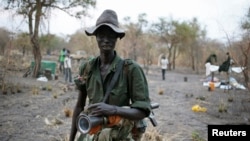JUBA —
Clashes erupted at the weekend between pro- and anti-government forces in Jonglei state, the largest state in South Sudan, officials from both sides said Monday.
Fighting was reported in Duk County and in Gadiang, rebel and government officials said.
Sudan People’s Liberation Army (SPLA) spokesman Philip Aguer said opposition forces attacked a military base at Gadiang on Sunday but were held off by government troops.
“Forces of Riek Machar attacked the SPLA position at Gadiang and they were repulsed, leaving behind them 173 killed," Aguer said.
Aguer said 10 SPLA soldiers were killed and 16 wounded in the fighting.
Gadiang is around 90 kilometers (55 miles) north of Bor, the state capital.
Opposition military spokesman Lul Ruai Koang blamed the government for started the fighting in the town by attacking rebel-held positions.
"We did not attack them. They attacked us," Koang said.
He called the casualty figures given by Aguer "unimaginable."
"On their side 10 and on our side 170? What are we using? Are we using pangas or what is happening? We did not lose that number of servicemen on our side,” he said.
Thon Leek, a lawmaker from Duk County, accused anti-government forces of raiding three of his county’s payams Sunday in retaliation for the clashes at Gadiang.
He says he received reports that as many as 43,000 residents fled ahead of the attacks, and two civilians were killed in Mareng, the main town of the county, which lies around 200 kilometers (120 miles) north of Bor.
Local authorities reported that the three villages targeted in the attacks were completely destroyed.
“They are destroying buildings, the schools and they also ransacked the commissioner’s house," he said.
"They torched houses of the local residents. They are reported to have killed about two people in Mareng. So one is not surprised of course. These are people who are actually not ready to rule. They are ready to destroy," he added.
Koang denied that opposition forces were responsible for the attacks in Duk County, blaming government troops instead.
“Probably the government forces and their allies mistook these Dinka villages for Nuer villages, simply because these people speak the Nuer language, have the same features, they more or less look like Nuer and the government mistook their villages for Nuer villages,” he said.
Leek said there are no government forces in Duk County. Aguer said the government has focused its attention on protecting larger towns in the state.
Jonglei state has seen some of the fiercest fighting during South Sudan's crisis that began in mid-December. The fighting has continued in Jonglei, the largest state in South Sudan, and the two oil-producing states that sandwich it even after a cessation of hostilities agreement was signed last month.
Sporadic fighting has continued in parts of South Sudan even as a second round of peace talks is continuing in Addis Ababa. Hundreds of thousands of civilians have been displaced by the fighting and thousands are believed to have been killed since mid-December.
Fighting was reported in Duk County and in Gadiang, rebel and government officials said.
Sudan People’s Liberation Army (SPLA) spokesman Philip Aguer said opposition forces attacked a military base at Gadiang on Sunday but were held off by government troops.
“Forces of Riek Machar attacked the SPLA position at Gadiang and they were repulsed, leaving behind them 173 killed," Aguer said.
Aguer said 10 SPLA soldiers were killed and 16 wounded in the fighting.
Gadiang is around 90 kilometers (55 miles) north of Bor, the state capital.
Opposition military spokesman Lul Ruai Koang blamed the government for started the fighting in the town by attacking rebel-held positions.
"We did not attack them. They attacked us," Koang said.
He called the casualty figures given by Aguer "unimaginable."
"On their side 10 and on our side 170? What are we using? Are we using pangas or what is happening? We did not lose that number of servicemen on our side,” he said.
Thon Leek, a lawmaker from Duk County, accused anti-government forces of raiding three of his county’s payams Sunday in retaliation for the clashes at Gadiang.
He says he received reports that as many as 43,000 residents fled ahead of the attacks, and two civilians were killed in Mareng, the main town of the county, which lies around 200 kilometers (120 miles) north of Bor.
Local authorities reported that the three villages targeted in the attacks were completely destroyed.
“They are destroying buildings, the schools and they also ransacked the commissioner’s house," he said.
"They torched houses of the local residents. They are reported to have killed about two people in Mareng. So one is not surprised of course. These are people who are actually not ready to rule. They are ready to destroy," he added.
Koang denied that opposition forces were responsible for the attacks in Duk County, blaming government troops instead.
“Probably the government forces and their allies mistook these Dinka villages for Nuer villages, simply because these people speak the Nuer language, have the same features, they more or less look like Nuer and the government mistook their villages for Nuer villages,” he said.
Leek said there are no government forces in Duk County. Aguer said the government has focused its attention on protecting larger towns in the state.
Jonglei state has seen some of the fiercest fighting during South Sudan's crisis that began in mid-December. The fighting has continued in Jonglei, the largest state in South Sudan, and the two oil-producing states that sandwich it even after a cessation of hostilities agreement was signed last month.
Sporadic fighting has continued in parts of South Sudan even as a second round of peace talks is continuing in Addis Ababa. Hundreds of thousands of civilians have been displaced by the fighting and thousands are believed to have been killed since mid-December.




